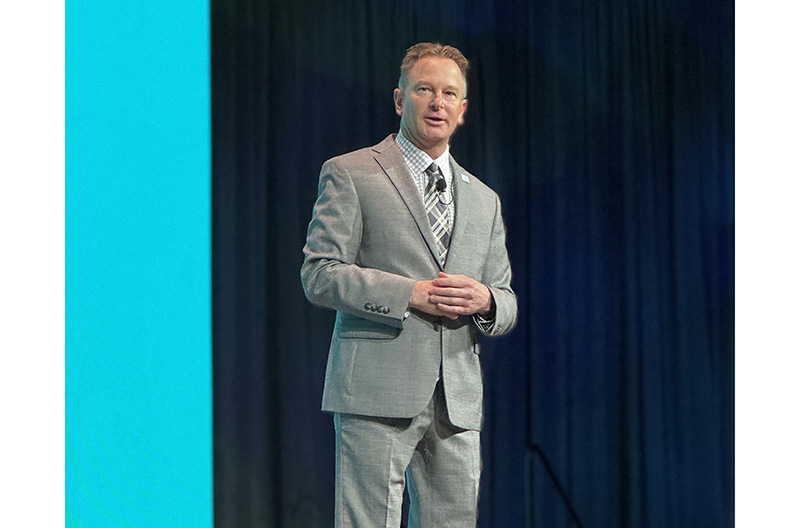Generational shifts, labor market trends and technology are just some of the challenges facing the dairy, deli and bakery industry. IDDBA President and CEO David Haaf spoke to these issues during his address on June 9 at the organization’s annual show in Houston.
Haaf noted the increased turnover rates in upper and lower-level management in recent years. While there is beginning to be some stabilization and leveling off in this area, he said it is a big opportunity in the industry.
“Couple this with continued competitive labor markets, and we’re going to continue facing complicated recruiting and retention of employees in our industry,” he said. “In addition, a mass number of those separations involve retirement of older workers, creating real and impactful generational shifts in our leadership. How we embrace those shifts will be points of differentiation in our growth and success of our industry.”
According to Haaf, companies must learn from the lessons of the COVID-19 pandemic and build upon those to better their operations. “We must be willing to reshape our workplace culture, to embrace and nurture our next generation of workers, and more importantly, leadership of tomorrow.”
Haaf said Gen Z makes up nearly a fifth of the American population. There are as many Gen Z-ers, or Zoomers, in the workplace as there are Baby Boomers. They are approaching 34 percent of the workforce, he noted.

Gen Z is sandwiched between Millennials and the latest demographic cohort, Gen Alpha. Haaf said Gen Z’s entry into the workplace has been characterized by multiple challenges, from the pandemic to record inflation and the cost-of-living crisis.
This younger generation likes to take things slower and enjoy life. It tends to be more serious about beliefs – climate control, human rights – and want to be part of meaningful change, he said.
GenZ-ers also tend to socialize in person less and are more self-critical, which may lead to being more susceptible to anxiety and depression. Haaf noted a recent Stanford University study looking at how Gen Z will shape the future workforce.
The findings stated there is an expectation of constant change.
“Growing up in a world of technological changes and uncertainty has given them characteristics of flexibility and resilience,” Haaf said. “Pragmatic, Gen Z have a strong sense of self-agency. They’re always one search engine away from readily seeking out answers for themselves. They want to make a difference. Gen Z-ers not only expect change, they demand it and they want to work for a place that is going to do good in the world.”
He said they value collaboration and teamwork. The digital world helps shape their identity through social media and online groups. They want team spirit, and they want leaders who will guide by consensus.
“They prefer less hierarchy and prefer collaborative leadership, where everyone has a say.”
This generation places a high priority on mental health and work-life balance. Gen Z-ers have fewer qualms about leaving a job to pursue better opportunities. While pay is important, there are many other considerations above and beyond salary for the Zoomers, Haaf said.
Looking at what this means for member companies and the industry, Haaf indicated several steps may be taken. These include investing in HR management training to better understand Gen Z mindsets; spending extra time and attention to meet the next era of workforce where it is; establishing internships and professional development programs that nurture relationship-building and people skills; and personal development is critical.
“What’s important to our young leaders today, in many cases is different from what our older leaders grew up on. Clearly communicating our company visions, job tasks and expectations is a must.”
Haaf said part of the IDDBA’s strategic initiatives include focusing on enhancing and creating more leadership development resources. Virtual learning tools and webinars afford members easy access to insights and information.
With staffing challenges due to turnover and the fact that the workforce is getting younger, IDDBA realizes there is a greater need to provide professional development resources.
“Heightening collaboration with members, agencies and industry resources is a key focus for us. We are prepared to meet our members where they are in this journey,” Haaf said.
Technology
One of IDDBA’s six guiding influences for 2024 is technology. Haaf noted the increasing availability and popularity of artificial intelligence.
He cited current examples at work in dairy, deli and bakery. These include leveraging AI to streamline and improve production processes, along with recipe development by crunching vast sums of data to find creative combinations of flavors and using sentiment analysis, which takes into account customers’ likes, don’t likes and might likes.
“Demand forecasting and inventory management is an area where AI sparkles. We can use sentiment analysis and ingredients they will need based on past demand, historical weather data, notable events and other key factors. We can even customize their products based on seasonality and holiday favorites.”

Haaf also discussed Internet of Things, or IoT integration, which refers to a network of devices that can communicate and share data over the Internet. He noted that IoT integration in retail deli and bakery departments involves connecting smart appliances, such as ovens and refrigerators, to a central system that monitors temperature and inventory levels in real time.
Augmented reality also is revolutionizing the way customers interact with deli and bakery departments, Haaf said, by enhancing engagement and customization opportunities and explorations, enabling customers to place custom orders in real time. For example, AR interfaces allow customers to visualize toppings, fillings and decorations on cakes, enhancing the customer experience and leading to repeat customers.
He also mentioned 3D food printing technology, where bakery departments may offer an option to add personalized 3D printed decorations on cakes.
With sourcing, sustainability and traceability of increasing importance to consumers, Haaf noted digital shelf labels can display product information, pricing and relevant details electronically. Benefits to the retailer include real time updates, allowing for instant updates on pricing, promotions and product descriptions and improved operational efficiency.
“Most impactful is instant labor savings. For example, no more changing hundreds and thousands of tags weekly.”
DSLs enhance the customer experience by providing clear and easy-to-read labels. They also can be leveraged to display additional product information, such as nutritional facts, reviews or product use recommendations.
Strategic initiatives
Haaf said IDDBA is heavily engaged in its strategic initiatives and long-range planning “to redefine and mold our vision, processes and resources to better support our great community of members and our industry.”
The association has broken the future down into three strategic imperatives: show evolution, extending impact and expanding audience.
The celebration experience of the show will be enhanced and also will involve understanding what the food show of tomorrow looks like. IDDBA is establishing insight-sharing formats and collaborating with a multitude of tradeshow industry professionals to better understand operational challenges, industry shifts and generational interests.
Members will be surveyed to find out what is important to them and their endeavors at future shows. The association also will be sharing insights on show costs and related expenses and offering cost streaming opportunities to exhibitors while still offering attendees a “wow” experience, according to Haaf.
Part of IDDBA’s strategic initiative of extending impact will involve learning and exploring smaller, more regional micro-site venues, taking educational resources to member markets and allowing vendor partners an opportunity to introduce products and services to a more local group of leadership and decision-makers.
In expanding IDDBA’s audience, Haaf said consolidation is and will continue to be one of the industry’s key challenges, both at retail and the manufacturers’ level. “Our strategic initiatives involve expanding the membership through outreach in other sectors of our industry, including c-store and college and universities.”
He added there will be a greater focus on foodservice, with sales accounting for 26.9 percent of in-store sales, which was up 1.3 percent in 2023.
“Foodservice awareness at retail is an opportunity. Many of our members and potential members don’t realize that retailers are a foodservice destination and have plenty of foodservice growth opportunities. It’s on us and our team to help grow that image.”
Haaf said IDDBA also will focus on growing and enhancing international relations. With members in 28 countries, he said there is an opportunity to become a top-of-mind resource in assisting overseas companies in understanding the process of getting their products and services into the U.S., connecting them with a multitude of distributors, brokers and retailers that are willing to partner or act as a liaison with them.
IDDBA mission
IDDBA’s mission of meeting people where they are will help its members in the evolution of people development and customer shopping habits. This also will assist members with valuable insights to help shape new strategies, product vision and services.
“Our industry … is a resilient one,” Haaf said. “Our partnerships are stronger than ever. IDDBA’s partnership is here for all our current and future members. We will continue to meet our members and our industry where they are. We will rise up and stand in the future together.”

